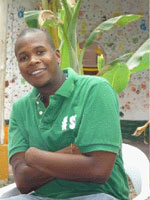 “I will always be against injustices, against inhumane acts and against lies. Therefore I have a vision of an egalitarian world, without hunger or excessive wealth and extreme poverty causing people to kill each other, a world full of unity, solidarity, art and love.”
“I will always be against injustices, against inhumane acts and against lies. Therefore I have a vision of an egalitarian world, without hunger or excessive wealth and extreme poverty causing people to kill each other, a world full of unity, solidarity, art and love.”
Jota Ramos’ UK tour :
Agroecology : Well Being and Human Rights in Cuba and Colombia
Haga que pasa: Make it happen!

Jota Ramos
Who is Jota?
Jota Ramos is a conscious young Colombian Hip Hop artist and community organiser from Villa Rica, in Cauca on the Pacific coast. As part of a tour of Latin America and Europe, he is showing and talking about short films made with the community, and giving concerts.
Jota and his community aim to build positive links with friends and supporters round the world, ‘to let the world know what is going on, so that we will not be alone on the path that we have chosen, towards freedom for our community’.
The Villa Rica community
Unity Peace Solidarity: a just world is possible – let’s work for it
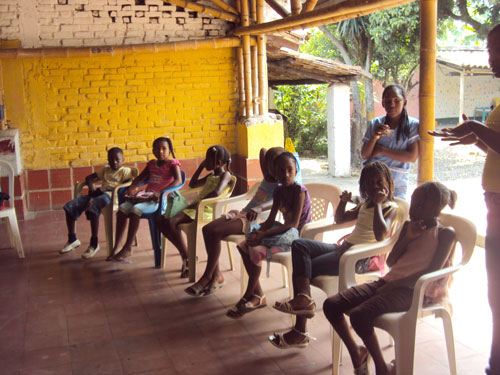
90% of inhabitants of Villa Rica, a town of 14,000, are of African descent. The great majority are poor or extremely poor.
Set up by residents in 1994, the Villa Rica Foundation has the aim of fostering unity, peace and solidarity. Traditional small-scale subsistence farming is actively promoted by the community, in order to build food sovereignty – resisting the encroachment of monoculture in the form of sugar plantations greedy for Villa Rica’s land.
The Villa Rica community prioritises raising children to be healthy, educated and knowledgeable about their African Colombian culture, identity and way of life. Young people are encouraged to play an active part in the community and its culture, and to avoid recruitment to armed groups or dependence on drugs or alcohol. This is evident in the politically-conscious lyrics of SOPORTE KLAN, Jota’s group of seven musicians from Villa Rica.
Why is the Villa Rica community in danger?
Resistance to the expansion of large companies, often with powerful allies, is dangerous. One sugar company pressing to take over Villa Rica’s land has links to a major media company in Colombia. Powerful forces oppose those who actively campaign for peace, and who resist the spread of substance abuse.
Jota has been physically attacked, and recently received threats to his life, warning him not to continue on the peaceful path taken by his community. Nonetheless, he is determined to return to carry on with this important work in Colombia.
The following is entirely drawn from an interview given to OXFAM in August 2010 for Protagonista del Mes (http://dalelavueltaalmundo.intermonoxfam.org/) and from his letter of introduction to Colombia Solidarity Campaign, UK, February 2010.

Message from Jota Ramos
My name is JOTA RAMOS, I work with SOPORTE KLAN which aims to mobilise the young people of my community through art and dance, to let the community know our ideas and to bring a message of change which will penetrate the heart of society.
SOPORTE KLAN is a Hip Hop group that was formed in Villa Rica in Cauca in 2001. It is made up of seven people from different towns in North Cauca and from the south of Cauca Valley, a union of different artistic young people who decided to realize a collective project which they named SOPORTE KLAN.
After first becoming known as a musical group which used songs and artistic presentations to spread awareness of our culture and customs, SOPORTE KLAN started to raise concerns about the social problems that our community was facing.
In 2005, the group asked for a space to work with young people in the Villa Rica Foundation, to begin our activities in the community. Our objective was not only to make social problems known through our music, but also to work to help reduce them.
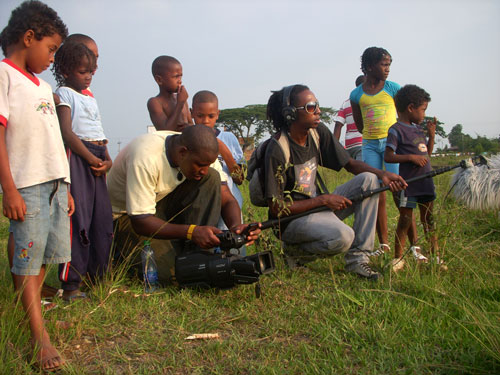
At the moment we have a school of performing arts which is aimed at raising political awareness. Through music, theatre, dance and audio-visual means, we tackle the different social problems that our community faces such as recruitment of youth by armed groups, loss of ethnic identity, drug addiction, crime and so on. The young people themselves witness these social problems and invite other youngsters and the community in general to act so that the problems do not overwhelm us and do not keep repeating themselves.
Consequences
“The truth is that all these types of work have consequences, consequences that I have accepted and I am ready to face and to continue with my work.
In May 2007, as I was returning from a performance, some members of an armed group operating at Paso de la Bolsa (in Valle del Cauca) stopped me and with a machete cut the tendons of three fingers of my left hand and two of my right hand.
A few months ago, they threatened me by email and told me to stop my community work and even called me ‘guerrillero’, the name they give to anyone that thinks differently in this country”
My community
 Villa Rica, the town I live in, is full of history, a history which dates from the times of the enslavement of Africans. Villa Rica is located in one of the estates with the highest usage of slaves in this period. It was called ‘Hacienda la Bolsa’ or Hacienda of Wood, and today is known as the “Hacienda del Alto’ or The High Estate.
Villa Rica, the town I live in, is full of history, a history which dates from the times of the enslavement of Africans. Villa Rica is located in one of the estates with the highest usage of slaves in this period. It was called ‘Hacienda la Bolsa’ or Hacienda of Wood, and today is known as the “Hacienda del Alto’ or The High Estate.
When slavery was abolished, people regained their freedom by occupying and working these lands. Because of this, the culture of Villa Rica is clearly a culture brought to us by our African forebears and which they left to us as a legacy: their music, their customs, dances, gastronomy and food, and traditions which still live in each one of Villa Rica’s citizens.
In my family, these cultural ways of living were always present, carrying on to each one of the descendants. I was motivated at home from an early age. I became a volunteer in the cultural and artistic groups in my area, and it is through this that I think that my life became full of artistic and cultural patterns, enabling me to enter any community and make contributions, reflections of these historical aspects such as art and culture.
Problems in my community
The North Cauca community lacks space and opportunities for personal development, where people can freely express themselves concerning their conflicts, needs and ways of thinking about the world, which in one way or another interest us all.
We have problems of unemployment relating to the absence of resources for higher education, for work or preparation for life after secondary school. The quality of education is poor. There is little space for healthy entertainment, a lack of encouragement for sports, poor personal development, and role models introduced by the mass media.
All this leads to a situation where the community sees a breakdown in its social fabric, with high rates of vandalism, consumption of drugs and alcohol, domestic violence, loss of Identity, and recruitment by armed groups.
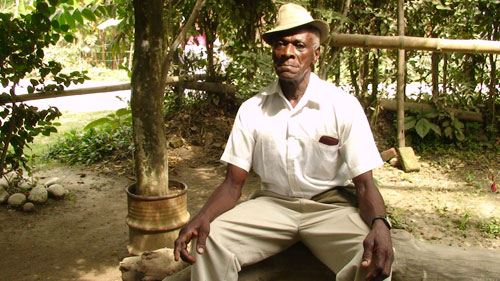
Documentary: Mi FinK – The struggle to keep our land and culture
The idea is to raise the profile of our work in Villa Rica. This year, we have launched our documentary called ‘Mi FinK’, showing how northern Cauca Afro-Colombiano families struggle so as not to have to leave or sell their lands to the monopoly that the sugar cane producers are trying to create. To them, their farms represent food security and a symbol of freedom.
The documentary reveals the trickery that the sugar cane producers have used in order to drag peasants away from their traditional way of farming so they can take over their land and establish a monoculture of sugar cane – and a new form of slavery for the people.
We would like to organise some discussions to address topics such as:
- The arrival of African descendants in northern Cauca
- The situation today of young Afro-Colombianos in Villa Rica, Cauca
- Traditional farming vs sugarcane producers
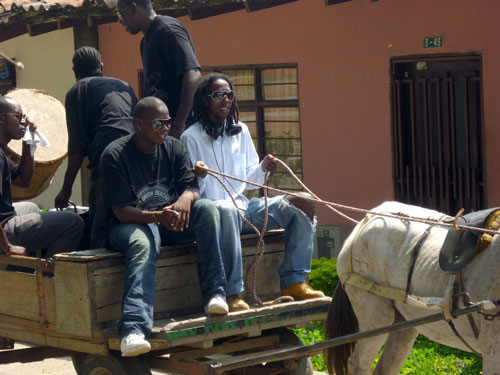
Accompany Villa Rica – Join our ongoing campaign
The struggle of the Afro-descendant community in Villa Rica forms part of a broader picture of oppression and resistance. There are an estimated 10 million Afro-Colombians, some 25% of the Colombian population. African descendants are mostly extremely poor and excluded from the mainstream. Despite progressive aspects of the 1991 Constitution that declared a pluri-ethnic country, in practice the collective rights of Afro-Colombian communities are not respected at all. The banning of Senator Piedad Cordoba from public office for 18 years typifies the establishment’s hostility to black political initiative.
Afro-Colombians form, along with indigenous peoples, campesinos and the urban poor, what is known as the ‘real Colombia’ of the popular classes. These groups have in the last three years begun to come together in the ‘Minga’, an alliance of grassroots resistance against being forced off the land. The Minga was inspired by indigenous communities taking direct action to liberate ‘Mother Earth’ from the grip of big landowners and multinationals: it is a new voice and a direct challenge to the wealth and legitimacy of the ruling elite.
As in the rest of Latin America, official Colombia is currently celebrating 200 years of independence from Iberian (Spanish and Portuguese) colonial rule. African descendants and indigenous people are asking ‘what independence?’ They are still not free. The dispossessed are again on the move for their freedom…but the risks are enormous.
For 60 years the Colombia state has murdered its critics, either directly or through the ‘deniable’ actions of paramilitary groups. A new generation has now stepped into the firing line. International solidarity is absolutely vital. Our campaign defends human rights, especially of workers and communities up against the multinationals.
Colombia Solidarity Campaign,
London 15 October 2010
We urge readers of this pamphlet to join us in an ongoing project to accompany the youth of Villa Rica, and to mobilise support for all social movements in Colombia.
Important links and contacts
CSC email: info@colombiasolidarity.uk
Fundación Villa Rica: http://www.fundacionvillarica.org
Haga Que Pase:hagaquepase@gmail.com
War Resisters International: http://wri-irg.org
Jota Myspace: http://www.myspace.com/jotaramos
Soporte Klan Myspace: http://www.myspace.com/soporteklan
DVD Make it Happen! Haga que Pase, includes ‘Mi FinK’ – £5 from CSC, (£4 goes to Villa Rica Foundation)
CAMPAIGN OBJECTIVES
The Colombia Solidarity Campaign is an anti-imperialist organisation, campaigning for a socially just and sustainable peace in Colombia, based on respect for the human rights and diversity of the Colombian people.
Your contribution and participation strengthens the Campaign. Membership entitles you to:
- three or four publications a year: Frontline Latin America and special DVD releases
- membership of local branch
- participation in national campaign commissions where possible
- decide campaign priorities and policy at Annual General Meeting
Annual rates
Individual membership is £7.50 or £15 for unwaged, waged.
Group affiliation is £30, £60, £120 for local, regional and national organisations.

